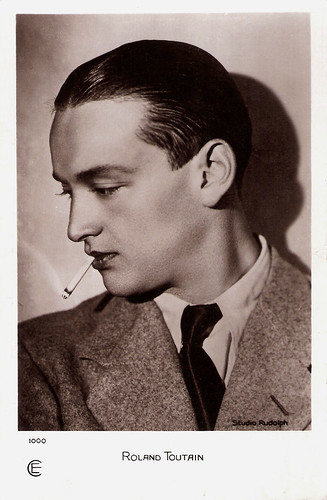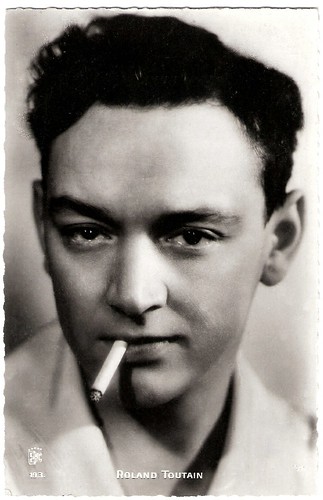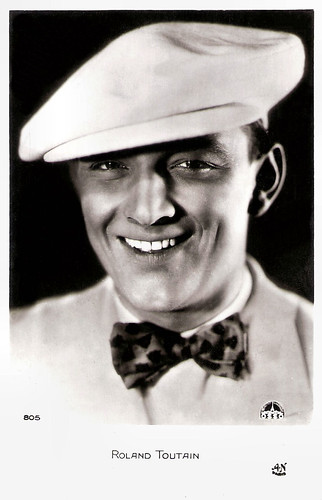Seductive daredevil Roland Toutain (1905-1977) was a French actor, songwriter and stuntman. He is best known for playing the aviator André Jurieux in Jean Renoir's film La Règle du jeu (1939).

French postcard by Cinémagazine-Selection, Paris, no. 1000. Photo: Studio Rudolph.
Roland Toutain was born in Paris in 1905. He was the son of a horse breeder from Normandy, and a fearless artist from Corsica. When he was two, his father liked to throw him in lake Vésinet, thinking he would learn to swim naturally that way.
As a teenager Toutain climbed the Eiffel Tower and loved to do acrobatics on cars and trains. He spent a lot of time on airports, so it was logical he was going to do aerial stunts.
The cinema attracted the young stuntman, who was an admirer of American film star Douglas Fairbanks. After meeting director Marcel L’Herbier, he played some small parts in the silent films La Galerie des monstres/Gallery of Monsters (Jaque Catelain, 1923) and L'Inhumaine (Marcel L'Herbier, 1924).
He first gained fame in the crime film Le mystère de la chambre jaune/The Mystery of the Yellow Room (Marcel L’Herbier, 1930) based on one of the first locked room mystery crime fiction novels, written by Gaston Leroux. Toutain was perfectly cast as the youthful journalist Joseph Rouletabille, Leroux's equivalent of Hercule Poirot or Sherlock Holmes.
Toutain returned in the sequel Le parfum de la dame en noir/The Perfume of the Lady in Black Room (Marcel L’Herbier, 1930), in fact one long story divided into two episodes. Later he reprised the role in Rouletabille aviateur/Flying Gold (Steve Sekely, 1932).
Toutain had a supporting role in Fritz Lang’s only French film, the fantasy Liliom (1934) starring Charles Boyer and Madeleine Ozeray.
He served as a foil to romantic young leads like Jean-Pierre Aumont in L'équipage/Flight Into Darkness (Anatole Litvak, 1935) and La porte du large/The Great Temptation (Marcel L'Herbier, 1936).
In 1937, he appeared in the French drama Yoshiwara (Max Ophüls, 1937) starring Pierre Richard-Willm, Sessue Hayakawa and Michiko Tanaka. The film is set in the Yoshiwara, the red-light district of Tokyo, in the nineteenth century.
His best known role is the aviator André Jurieux in the a satire of the upper-middle classes La Règle du jeu/The Rules of the Game (Jean Renoir, 1939). The film capitalized on stories in fan magazines about Toutain’s daredevil air stunts and his reckless personality.
In the film, the French aviation hero has fallen in love with Christine de la Chesnaye (Nora Gregor), who is married to wealthy aristocrat Marquis Robert de la Chesnaye (Marcel Dalio). Renoir’s classic comedy of manners contrasts the romantic entanglements of rich and poor during a a weekend hunting party at the country estate.
In the 1930s Toutain was befriended with boxer Al Brown and together they would often hit the nightclubs of Montmartre.

French postcard by A.N., Paris, no. 722. Photo R. Tomarif [?], Nice / Osso. Could be a publicity still for the film Le mystère de la chambre jaune (Marcel L'Herbier, 1930).

French postcard by EPC, no. 193.
During the 1940s, Roland Toutain played the seductive charmer in several interesting adventure films. He appeared as Scapin in Le capitaine Fracasse/Captain Fracasse (Abel Gance, 1942) with Fernand Gravey, and played a garage owner in the box office hit L'Éternel retour/The Eternal Return (Jean Delannoy, 1943), written by Jean Cocteau, and starring Madeleine Sologne and Jean Marais.
Then he was Cabrion, in Les Mystères de Paris/The Mysteries of Paris (Jacques de Baroncelli, 1943). He reunited with Marcel L’Herbier for La vie de bohème (Marcel L’Herbier, 1945) starring María Dénis and Louis Jourdan.
In his films he jumped off a moving train into a river and did trapeze stunts under a flying airplane. In 1949, he founded the Club des Casse-cou (Club Daredevil), bringing together the famous stuntmen of the time, including specialist Gil Delamare who died in 1966 during the filming of Le Saint prend l'Affût.
In 1951, Toutain had an accident for the umpteenth time and one of his legs had to be amputated. Still in his final film, L'inspecteur aime la bagarre/The inspector likes to fight (Jean-Devaivre, 1956), he did some amazing stunts.
After his retirement he spent his time generously for La roue tourne, an association dedicated to needy actors. He lived with his mother in Argenteuil, where he died in poverty in 1977, at the age of 71.
His good friend Jean Marais organized his funeral. Toutain lies buried in Argentueil, with a miniature of a stuntman on top of a plane on his grave.
Roland Toutain married and divorced three times. With his girlfriend Odette Calais, he had a son: actor Jacques Maire, whom he never recognized, despite mediation by Jean Marais.
In 1951 he published his souvenirs as Les quatre cents coups, with prefaces by Jean Cocteau and Joseph Kessel. In French 'faire les 400 coups' means committing all the possible stupidities. Les quatre cents coups/The 400 blows 1959) is also the title of a famous film by François Truffaut.

French postcard by Editions EC, no. 36. Photo: Discina.

French postcard by A.N., Paris, no. 805. Photo: Osso Films. Publicity still for Rouletabille aviateur (Steve Szekely, 1932).
Sources: Wikipedia (French) and IMDb.

French postcard by Cinémagazine-Selection, Paris, no. 1000. Photo: Studio Rudolph.
Daredevil Air Stunts
Roland Toutain was born in Paris in 1905. He was the son of a horse breeder from Normandy, and a fearless artist from Corsica. When he was two, his father liked to throw him in lake Vésinet, thinking he would learn to swim naturally that way.
As a teenager Toutain climbed the Eiffel Tower and loved to do acrobatics on cars and trains. He spent a lot of time on airports, so it was logical he was going to do aerial stunts.
The cinema attracted the young stuntman, who was an admirer of American film star Douglas Fairbanks. After meeting director Marcel L’Herbier, he played some small parts in the silent films La Galerie des monstres/Gallery of Monsters (Jaque Catelain, 1923) and L'Inhumaine (Marcel L'Herbier, 1924).
He first gained fame in the crime film Le mystère de la chambre jaune/The Mystery of the Yellow Room (Marcel L’Herbier, 1930) based on one of the first locked room mystery crime fiction novels, written by Gaston Leroux. Toutain was perfectly cast as the youthful journalist Joseph Rouletabille, Leroux's equivalent of Hercule Poirot or Sherlock Holmes.
Toutain returned in the sequel Le parfum de la dame en noir/The Perfume of the Lady in Black Room (Marcel L’Herbier, 1930), in fact one long story divided into two episodes. Later he reprised the role in Rouletabille aviateur/Flying Gold (Steve Sekely, 1932).
Toutain had a supporting role in Fritz Lang’s only French film, the fantasy Liliom (1934) starring Charles Boyer and Madeleine Ozeray.
He served as a foil to romantic young leads like Jean-Pierre Aumont in L'équipage/Flight Into Darkness (Anatole Litvak, 1935) and La porte du large/The Great Temptation (Marcel L'Herbier, 1936).
In 1937, he appeared in the French drama Yoshiwara (Max Ophüls, 1937) starring Pierre Richard-Willm, Sessue Hayakawa and Michiko Tanaka. The film is set in the Yoshiwara, the red-light district of Tokyo, in the nineteenth century.
His best known role is the aviator André Jurieux in the a satire of the upper-middle classes La Règle du jeu/The Rules of the Game (Jean Renoir, 1939). The film capitalized on stories in fan magazines about Toutain’s daredevil air stunts and his reckless personality.
In the film, the French aviation hero has fallen in love with Christine de la Chesnaye (Nora Gregor), who is married to wealthy aristocrat Marquis Robert de la Chesnaye (Marcel Dalio). Renoir’s classic comedy of manners contrasts the romantic entanglements of rich and poor during a a weekend hunting party at the country estate.
In the 1930s Toutain was befriended with boxer Al Brown and together they would often hit the nightclubs of Montmartre.

French postcard by A.N., Paris, no. 722. Photo R. Tomarif [?], Nice / Osso. Could be a publicity still for the film Le mystère de la chambre jaune (Marcel L'Herbier, 1930).

French postcard by EPC, no. 193.
Les quatre cents coups
During the 1940s, Roland Toutain played the seductive charmer in several interesting adventure films. He appeared as Scapin in Le capitaine Fracasse/Captain Fracasse (Abel Gance, 1942) with Fernand Gravey, and played a garage owner in the box office hit L'Éternel retour/The Eternal Return (Jean Delannoy, 1943), written by Jean Cocteau, and starring Madeleine Sologne and Jean Marais.
Then he was Cabrion, in Les Mystères de Paris/The Mysteries of Paris (Jacques de Baroncelli, 1943). He reunited with Marcel L’Herbier for La vie de bohème (Marcel L’Herbier, 1945) starring María Dénis and Louis Jourdan.
In his films he jumped off a moving train into a river and did trapeze stunts under a flying airplane. In 1949, he founded the Club des Casse-cou (Club Daredevil), bringing together the famous stuntmen of the time, including specialist Gil Delamare who died in 1966 during the filming of Le Saint prend l'Affût.
In 1951, Toutain had an accident for the umpteenth time and one of his legs had to be amputated. Still in his final film, L'inspecteur aime la bagarre/The inspector likes to fight (Jean-Devaivre, 1956), he did some amazing stunts.
After his retirement he spent his time generously for La roue tourne, an association dedicated to needy actors. He lived with his mother in Argenteuil, where he died in poverty in 1977, at the age of 71.
His good friend Jean Marais organized his funeral. Toutain lies buried in Argentueil, with a miniature of a stuntman on top of a plane on his grave.
Roland Toutain married and divorced three times. With his girlfriend Odette Calais, he had a son: actor Jacques Maire, whom he never recognized, despite mediation by Jean Marais.
In 1951 he published his souvenirs as Les quatre cents coups, with prefaces by Jean Cocteau and Joseph Kessel. In French 'faire les 400 coups' means committing all the possible stupidities. Les quatre cents coups/The 400 blows 1959) is also the title of a famous film by François Truffaut.

French postcard by Editions EC, no. 36. Photo: Discina.

French postcard by A.N., Paris, no. 805. Photo: Osso Films. Publicity still for Rouletabille aviateur (Steve Szekely, 1932).
Sources: Wikipedia (French) and IMDb.
No comments:
Post a Comment